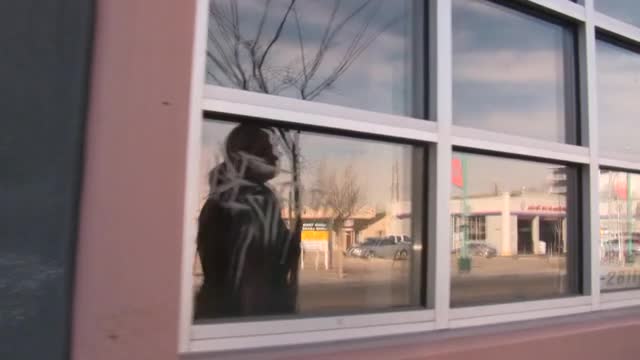Artisode; 1.11; Maria Benitez

- Transcript
I don't think it really speaks to me, but, you know, I hate the idea of seeing things just dull and drab. Sometimes I like to see that better than just, I don't know, piece of wood. Some people do see it as defacement or as wrong. I would say it's like way sicker makes everything look, makes a city look way dope with it. Street art can be a painting that's left anywhere, just for somebody to see or take. It can be splash of color on the wall, it can be a wheat paste, which is like what you see here. Graffiti can be street art, but street art can't be graffiti. It can be sculpture on the street. Basically, the word street art is used for art that's on the street, but that is illegal. We were all happy when this happened because we have a really ugly dumpster, now it's been
beautified. Like that, I think it's kind of cute, actually. Art is good in any form. Part of the art is in creating the actual images, but a big part of the art is the installation, the act of putting it on a wall creates a whole other statement than just, you know, these images just in someone's house or in a gallery would say, having them in the streets is what makes them poignant and meaningful. I think it's just as tasteful as anything you see on billboards. I mean, for the most part, most of the ads are all sexually orientated, like, in general. Something that's nice, tasteful, and makes it walled look better than it does. Look at this building and it's, you know, they're not using it anymore, and so the windows are getting broken out and stuff like that, so, I don't know, I think it's a natural tendency for human beings, for to want to put art on it just as much as they want to throw rocks through the window, I
guess. I mean, I'm all for street art, but if it's placed without the owners' consent, how is it different than tagging? How is it different than vandalism? We think it's just really funny urban enhancement and just the dumpsters in plywood, you know, they belong to the world. No one's being hurt by putting something on a dumpster, on a piece of plywood, on a abandoned building. It's a lot different than the art world. I think that street art is interesting in the way that it is anonymous. Nobody's trying to get any fame out of it. They are just truly doing art for whoever wants to see it.
- Series
- Artisode
- Episode Number
- 1.11
- Episode
- Maria Benitez
- Producing Organization
- KNME-TV (Television station : Albuquerque, N.M.)
- Contributing Organization
- New Mexico PBS (Albuquerque, New Mexico)
- AAPB ID
- cpb-aacip-312a6e46c59
If you have more information about this item than what is given here, or if you have concerns about this record, we want to know! Contact us, indicating the AAPB ID (cpb-aacip-312a6e46c59).
- Description
- Series Description
- Flamenco dancer Maria Benitez discusses her passion for flamenco dancing, her approach to her art, her experiences as a dancer, and how she shares this passion with the next generations. Footage includes clips of Benitez dancing throughout her career. Guest: Maria Benitez (Flamenco Dancer and Artist).
- Asset type
- Episode
- Genres
- Miniseries
- Media type
- Moving Image
- Duration
- 00:03:10.723
- Credits
-
-
Producer: Kowalski, Kelly
Producing Organization: KNME-TV (Television station : Albuquerque, N.M.)
- AAPB Contributor Holdings
-
KNME
Identifier: cpb-aacip-b359e42ffd8 (Filename)
Format: XDCAM
If you have a copy of this asset and would like us to add it to our catalog, please contact us.
- Citations
- Chicago: “Artisode; 1.11; Maria Benitez,” New Mexico PBS, American Archive of Public Broadcasting (GBH and the Library of Congress), Boston, MA and Washington, DC, accessed December 21, 2025, http://americanarchive.org/catalog/cpb-aacip-312a6e46c59.
- MLA: “Artisode; 1.11; Maria Benitez.” New Mexico PBS, American Archive of Public Broadcasting (GBH and the Library of Congress), Boston, MA and Washington, DC. Web. December 21, 2025. <http://americanarchive.org/catalog/cpb-aacip-312a6e46c59>.
- APA: Artisode; 1.11; Maria Benitez. Boston, MA: New Mexico PBS, American Archive of Public Broadcasting (GBH and the Library of Congress), Boston, MA and Washington, DC. Retrieved from http://americanarchive.org/catalog/cpb-aacip-312a6e46c59